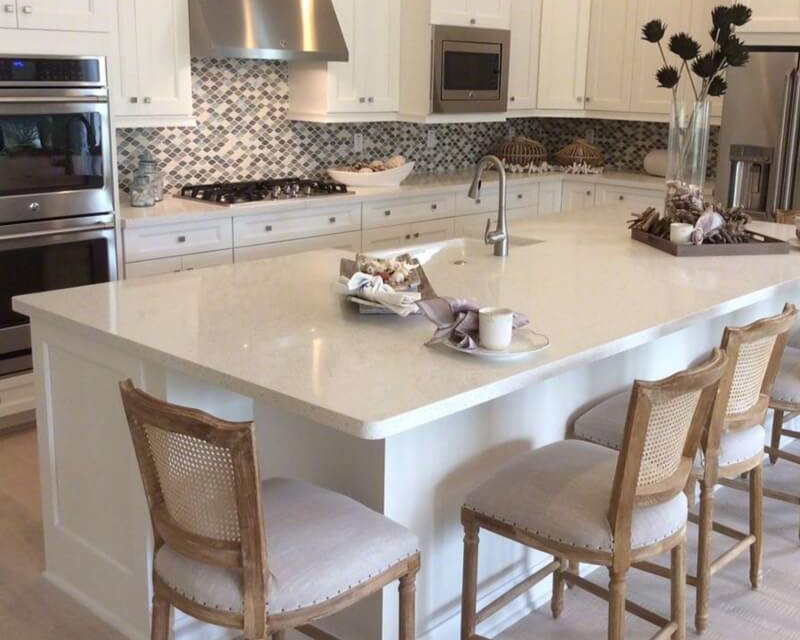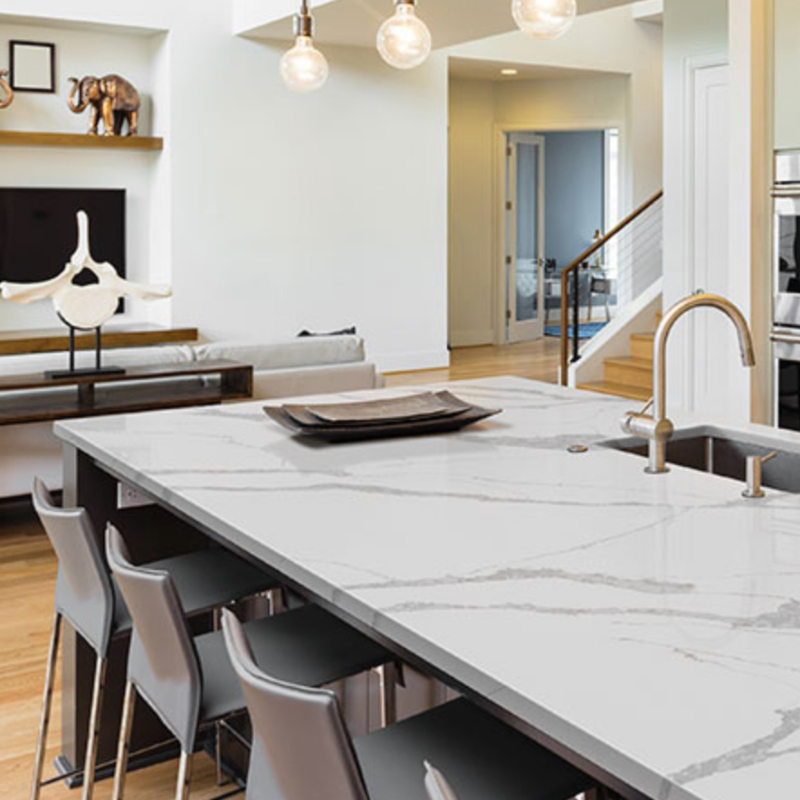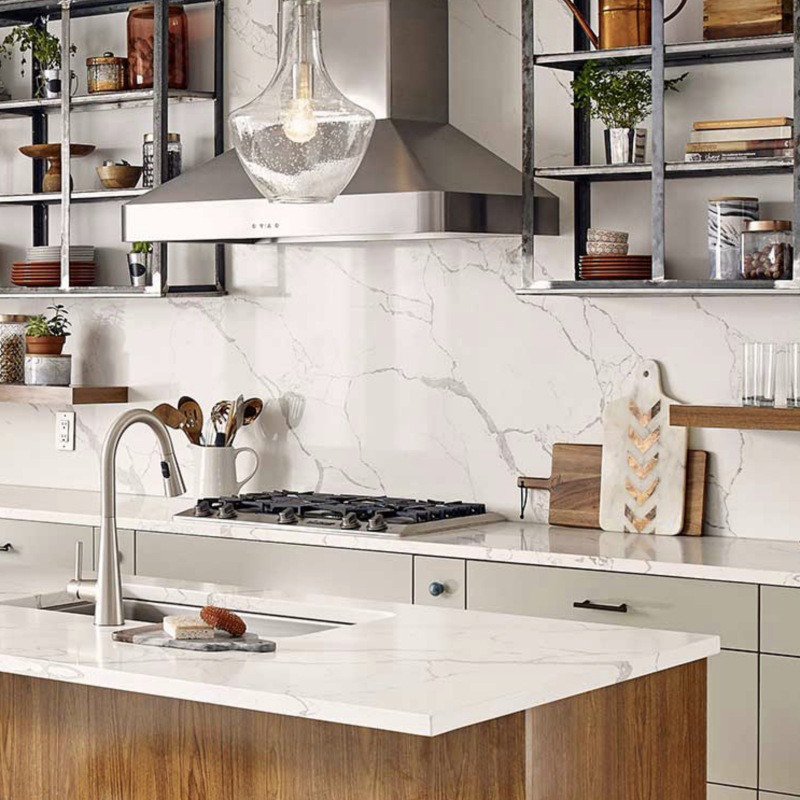10 Things You Did Not Know About Quartz Countertops
September 30, 2019
If quartz countertops are on your must-have list for your home or business, then rest assured that you’re not the only engineered stone fanatic. Many are turning to this top surface option because of its durability, design styles, and very low maintenance. While a quartz lover like yourself might already be familiar with the popular product, you may be surprised by some of these 10 things you didn’t know about quartz countertops.
1. Quartz Is Not a Budget Alternative to Natural Stone
Some might believe that quartz is a budget alternative to natural stone, but this high-end performance surface is definitely not. Prices per square foot for quartz are actually very close to the cost of natural stone. While it used to have a reputation as being a more easily fabricated slab of granite, quartzite, or marble, it has its own look and benefits like nothing else and holds ground as its own premium material.
2. It Is the Preferred Marble-Look Surface
Quartz is known for realistically mimicking a wide variety of countertop styles, but the most popular is marble look quartz. It is far superior to granite marble looks for several reasons. With the choice for different backgrounds and bold or soft veining, you can get the exact color and pattern that is consistent. This is especially important when wanting separate quartz slabs to be easily matched. Also, it is not susceptible to stains, scratches, water spots, and etching and does not require nearly the amount of maintenance needed for real marble.
3. Quartz Is Engineered
While quartz countertops do contain quartz, the most common mineral on earth, it is not mined like other natural stones. Instead, crushed up quartz as well as other stone aggregates or mineral fillers make up approximately 90 percent or more of the surface. The other 10 percent consists of cement-based or polymeric binders that help turn the mix into a solid slab, pigments that give it its color or hue, hardening additives, and antimicrobial agents to help protect the surface from growing bacteria.
4. Quartz Does Not Need Sealants
Unlike natural stone, quartz is a non-porous surface that will never need to be sealed. Even though the engineered countertop contains a large amount of natural stones in it, the material goes through a process to create a completely compacted mixture that has been pressurized and heated. This results in a countertop that is virtually impenetrable.
5. Quartz and Quartzite Are Very Different
You may have heard quartz and quartzite used interchangeably, but that is oh so wrong in the stone world. Quartzite is a metamorphic rock that is mined, and while it is a beautiful and durable stone, it does come with more maintenance, as it needs to be re-sealed every few years. Whereas, quartz is a manufactured stone mixed with real quartz and man-made materials with almost no maintenance. There are also almost limitless numbers of quartz countertop colors to choose from like bold hues, while quartzite comes in more neutral tones like beiges, browns, grays, blacks, and subtle blues.
6. Don’t Be Fooled by Cheaper Quartz
Quartz ranges in cost per square foot, but don’t necessarily be lured by the lesser-priced products. That’s because corners are usually cut to provide countertops for a lower price, and this can include adding in more resin and less quartz, creating thinner and possibly more delicate slabs, as well as coloration that isn’t produced throughout the material.
7. Breton Technology Is Licensed in Countries Outside Italy
The Breton company founded in northeast Italy came up with the technology needed to create engineered stone way back in 1963, and the process was licensed under the trademarked word Bretonstone. Today, this technology and process has been licensed to more than 50 companies located around the world. One of the reasons why quartz countertops are so readily available to consumers now is because there are so many manufacturers who are able to create products to meet those needs. But, if everything was still imported from Italy, the price point would probably be too high for many.
8. Quartz Is the Best-Selling Countertop in the Country
According to July 2013’s Consumer Reports, quartz was ranked as the No. 1 kitchen countertop surface. Since then, the non-porous product has only increased in popularity. More residential, commercial, and industrial industries are incorporating quartz into their designs, including quartz that looks like concrete. Its flexibility to be used as backsplashes, hearths, and other surface materials is another reason why it’s so appealing to include.
9. Quartz Countertops Are Eco-Friendly
Even though quartz is engineered, it’s still eco-friendly. That’s because no quartz is quarried specifically for countertops. Instead, it uses stone waste by-products and puts them to good use. Over the years, there have been more natural resins being used instead of so many synthetic ones. Breton’s Biolenic Resins use a combination of organic resins from non-food vegetable oils with artificial resins.
10. Quartz Was Never First Used as a Countertop
Quartz inventor Marcello Toncelli of the Breton company did not start using quartz as countertops. In fact, they were first used as floor tiles. The 12-by-20-inch mini slabs were hand poured and then cut. It wasn’t until years later that the technology was used for quartz countertops, and even then, the first slabs from the mid-1970s were approximately 50 inches long, so you would definitely see more seams than there would be today.
Quartz comes with many benefits that are so good that you won’t want to pass it up! The man-made material is extremely durable. It resists stains, scratches, and heat, and its antimicrobial properties means bacteria won’t grow on your surface. Its low maintenance makes it easy to keep it clean with a soft, wet cloth and some mild dish soap, and one of the biggest upkeep pluses is that it never ever needs to be sealed unlike natural stone. It’s made to last, so you can take advantage of MSI’s lifetime warranty on their Q Quartz countertops.
More Information on Quartz Countertops
Your Kitchen Remodel Needs A Modern Quartz Countertop
From Crystals to Countertops How Quartz Countertops Are Made
Stunning Quartz Countertops Concrete and Matte Looks



